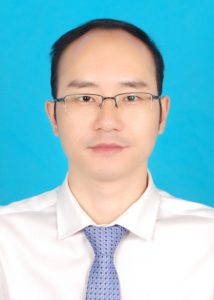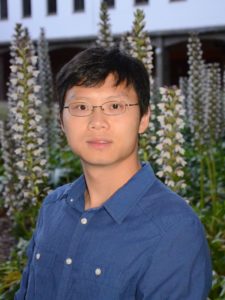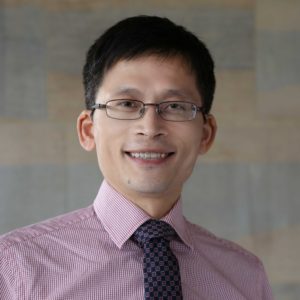W3: Symbiotic Radio Paradigm for Integrated Active and Passive Communications
Organizer: Gang Yang
Organizer: Xiangyun Zhou
Organizer: Zilong Liu
Abstract: Future wireless networks are expected to support a variety of emerging services, such as Internet-of-Everything (IoE), holographic telepresence, wireless brain computer interactions, and multisensory augmented and virtual reality. It is thus critical to design spectrum-, energy- and cost-efficient wireless communication technologies. Recently, symbiotic radio (SR) that integrates active and passive communications has emerged as a promising technology to fulfill such demand. SR has a wide range of applications such as E-health, wireless body area networks, smart home, and mobile cellular networks. Specifically, SR enables (secondary) low-cost passive backscattering or reflecting devices to modulate information over ambient (primary) radio-frequency (RF) carriers without using power-hungry RF transmitter. The primary system collaborates with the secondary system. Both systems benefit from each other. That is, the secondary system shares the primary system’s infrastructure, RF source and spectrum; while the secondary transmission provides beneficial multipath for the primary system.
This workshop will focus on theoretical and practical design issues for SR, including information-theoretic analysis, transceiver design, signal reprocessing, resource allocation, prototypes, new applications, etc. We aim to bring together researchers, engineers, and individuals working on the related areas to share their new ideas, latest findings, and state-ofthe- art results.
This workshop will be a half-day workshop with 2 invited keynotes, and 2 technical sessions of oral presentations. The invited speakers will be world leading researchers in the focused area. The technical sessions feature 2 invited papers plus 5-6 high-quality regular papers. The sessions are separated by tea breaks and lunch to facilitate off-line discussions and networking.
Steering Committee:
Erik G. Larsson, Linköping Uni., Sweden
Marco Di Renzo, Paris-Saclay Uni.-CNRS, France
Olav Tirkkonen, Aalto Uni., Finland
Zhu Han, Uni. of Houston, USA
Technical Program Committee:
Arumugam Nallanathan, Queen Mary Uni. of London, UK
Riku Jäntti, Aalto Uni., Finland
Francesco Verde, National Inter-Uni. Consortium for Telecommun., Italy
Chau Yuen, Singapore Uni. of Technology & Design, Singapore
Feifei Gao, Tsinghua Uni., China
Salman Durrani, Australian National Uni., Australia
Michael Taynnan Barros, Uni. of Essex, UK
Karim G. Seddik, The American Uni. in Cairo, Egypt
Van-Dinh Nguyen, Uni. of Luxembourg, Luxembourg
Donatella Darsena, Uni. of Napoli Parthenope, Italy
Jingon Joung, Chung-Ang Uni., South Korea
Saman Atapattu Mudiyanselage, Uni. of Melbourne, Australia
Qing Wang, Delft Uni. of Technology, Netherland
Deepak Mishra, Uni. of New South Wales, Australia
Gongpu Wang, Beijing Jiaotong Uni., China
Shimin Gong, Sun Yat-Sen Uni., China
Hoang Dinh, Uni. of Technology Sydney, Australia
Shiying Han, Nankai Uni., China
 Bio: Gang Yang is an Associate Professor with the Center for Intelligent Networking and Communications (CINC), and the National Key Laboratory of Science and Technology on Communications, University of Electronic Science and Technology of China. His research interests include symbiotic radio, backscatter communications, Internet-of-Things communications, and multi-antenna multi-carrier wireless communications. He has published 15 prestigious IEEE journal and conference papers on SR and backscatter communications, among which two IEEE transactions papers are listed as Essential Science Indicators Highly Cited Papers, and one IEEE Globecom paper on SR received the IEEE Communications Society Transmission, Access, and Optical Systems (TAOS) Technical Committee Best Paper Award in 2016. He served for the IEEE Globecom’17 as Publicity Co-Chair. He was the leading organizer of a previous similar workshop, titled with “Ambient Backscatter Communications for Energy- and Spectrum-Efficient IoT Networks”, in 2019 IEEE/CIC International Conference on Communications in China (ICCC).
Bio: Gang Yang is an Associate Professor with the Center for Intelligent Networking and Communications (CINC), and the National Key Laboratory of Science and Technology on Communications, University of Electronic Science and Technology of China. His research interests include symbiotic radio, backscatter communications, Internet-of-Things communications, and multi-antenna multi-carrier wireless communications. He has published 15 prestigious IEEE journal and conference papers on SR and backscatter communications, among which two IEEE transactions papers are listed as Essential Science Indicators Highly Cited Papers, and one IEEE Globecom paper on SR received the IEEE Communications Society Transmission, Access, and Optical Systems (TAOS) Technical Committee Best Paper Award in 2016. He served for the IEEE Globecom’17 as Publicity Co-Chair. He was the leading organizer of a previous similar workshop, titled with “Ambient Backscatter Communications for Energy- and Spectrum-Efficient IoT Networks”, in 2019 IEEE/CIC International Conference on Communications in China (ICCC).
 Bio: Xiangyun Zhou is an Associate Professor at the Australian National University. His research interests are in the fields of communication theory and wireless networks. He has published numerous papers on the topic of energy-constrained IoT communications, one of which received the IEEE ComSoc Asia-Pacific Outstanding Paper Award in 2016. He has served as an Editor for IEEE Transactions on Wireless Communications and IEEE Wireless Communications Letters, and as a Senior Editor for IEEE Communications Letters. He was a former chair of the Special Interest Group on Energy Harvesting Communication Networks within the IEEE ComSoc technical committee on green communications and computing. He served as co-chair of technical symposium/track for VTC’17-Spring and ICC’20. He has rich experience in workshop organization including 8 ICC/Globecom workshops (at ICC’14-16 and Globecom’15-18).
Bio: Xiangyun Zhou is an Associate Professor at the Australian National University. His research interests are in the fields of communication theory and wireless networks. He has published numerous papers on the topic of energy-constrained IoT communications, one of which received the IEEE ComSoc Asia-Pacific Outstanding Paper Award in 2016. He has served as an Editor for IEEE Transactions on Wireless Communications and IEEE Wireless Communications Letters, and as a Senior Editor for IEEE Communications Letters. He was a former chair of the Special Interest Group on Energy Harvesting Communication Networks within the IEEE ComSoc technical committee on green communications and computing. He served as co-chair of technical symposium/track for VTC’17-Spring and ICC’20. He has rich experience in workshop organization including 8 ICC/Globecom workshops (at ICC’14-16 and Globecom’15-18).
 Bio: Zilong Liu is a Lecturer (Assistant Professor) at the School of Computer Science and Electronics Engineering, University of Essex. From Jan. 2018 to Nov. 2019, he was a Senior Research Fellow at the Institute for Communication Systems (ICS), Home of the 5G Innovation Centre (5GIC), University of Surrey. His research lies in the interplay of coding, signal processing, and communications, with a major objective of bridging theory and practice as much as possible. He is a Senior Member of IEEE and an Associate Editor of IEEE Access and Frontiers in Communications and Networks. He is a General Co-Chair for 2021 International Workshop on Signal Design and its Applications in Communications (IWSDA) and a TPC Co-Chair of the 2020 IEEE International Conference on Advanced Networks and Telecommunications Systems (ATTS).
Bio: Zilong Liu is a Lecturer (Assistant Professor) at the School of Computer Science and Electronics Engineering, University of Essex. From Jan. 2018 to Nov. 2019, he was a Senior Research Fellow at the Institute for Communication Systems (ICS), Home of the 5G Innovation Centre (5GIC), University of Surrey. His research lies in the interplay of coding, signal processing, and communications, with a major objective of bridging theory and practice as much as possible. He is a Senior Member of IEEE and an Associate Editor of IEEE Access and Frontiers in Communications and Networks. He is a General Co-Chair for 2021 International Workshop on Signal Design and its Applications in Communications (IWSDA) and a TPC Co-Chair of the 2020 IEEE International Conference on Advanced Networks and Telecommunications Systems (ATTS).
Keynote Speakers:
Ying-Chang Liang
Bio: Ying-Chang Liang is currently a Professor with the University of Electronic Science and Technology of China, Chengdu, China, where he leads the Center for Intelligent Networking and Communications and serves as the Deputy Director of the Artificial Intelligence Research Institute. He was a Professor with the University of Sydney, Sydney, NSW, Australia, a Principal Scientist and a Technical Advisor with the Institute for Infocomm Research, Singapore, and a Visiting Scholar with Stanford University, Stanford, CA, USA. His research interests include wireless networking and communications, cognitive radio, symbiotic networks, dynamic spectrum access, the Internet of Things, artificial intelligence, and machine learning techniques.
Dr. Liang was elected a Fellow of the IEEE for contributions to cognitive radio communications, and received the Prestigious Engineering Achievement Award from the Institution of Engineers, Singapore, in 2007; the Outstanding Contribution Appreciation Award from the IEEE Standards Association, in 2011; the Recognition Award from the IEEE Communications Society Technical Committee on Cognitive Networks, in 2018. He has also received numerous paper awards, with the recent ones including IEEE ICC Best Paper Award in 2017, IEEE ComSoc’s TAOS Best Paper Award in 2016, IEEE Jack Neubauer Memorial Award in 2014; and the IEEE Communications Society APB Outstanding Paper Award, in 2012.
Dr Liang has been recognized by Thomson Reuters (currently, Clarivate Analytics) as a Highly Cited Researcher, since 2014. He is a foreign member of Academia Europaea. He is the Founding Editor-in-Chief of the IEEE JOURNAL ON SELECTED AREAS IN COMMUNICATIONS: COGNITIVE RADIO SERIES, and the Key Founder and currently the Editor-in-Chief of the IEEE TRANSACTIONS ON COGNITIVE COMMUNICATIONS AND NETWORKING. He is also serving as an Associate Editor-in-Chief for China Communications. He served as a Guest/Associate Editor for the IEEE TRANSACTIONS ON WIRELESS COMMUNICATIONS, the IEEE JOURNAL OF SELECTED AREAS IN COMMUNICATIONS, the IEEE Signal Processing Magazine, the IEEE TRANSACTIONS ON VEHICULAR TECHNOLOGY, and the IEEE TRANSACTIONS ON SIGNAL AND INFORMATION PROCESSING OVER NETWORK. He was also an Associate Editor-in-Chief of the Journal on Random Matrices: Theory and Applications (World Scientific). He was a Distinguished Lecturer of the IEEE Communications Society and the IEEE Vehicular Technology Society. He was the Chair of the IEEE COMMUNICATIONS SOCIETY TECHNICAL COMMITTEE ON COGNITIVE NETWORKS, and served as the TPC Chair and the Executive Co-Chair for the IEEE Globecom’17.
Dusit Niyato
Bio: Dusit Niyato is currently a professor in the School of Computer Science and Engineering and, by courtesy, School of Physical & Mathematical Sciences, at the Nanyang Technological University, Singapore. He received B.E. from King Mongkuk’s Institute of Technology Ladkrabang (KMITL), Thailand in 1999 and Ph.D. in Electrical and Computer Engineering from the University of Manitoba, Canada in 2008. He has published more than 380 technical papers in the area of wireless and mobile networking, and is an inventor of four US and German patents. He has authored four books including “Game Theory in Wireless and Communication Networks: Theory, Models, and Applications” with Cambridge University Press. He won the Best Young Researcher Award of IEEE Communications Society (ComSoc) Asia Pacific (AP) and The 2011 IEEE Communications Society Fred W. Ellersick Prize Paper Award. Currently, he is serving as a senior editor of IEEE Wireless Communications Letter, an area editor of IEEE Transactions on Wireless Communications (Radio Management and Multiple Access), an area editor of IEEE Communications Surveys and Tutorials (Network and Service Management and Green Communication), an editor of IEEE Transactions on Communications, an associate editor of IEEE Transactions on Mobile Computing, and IEEE Transactions on Cognitive Communications and Networking. He was a guest editor of IEEE Journal on Selected Areas on Communications. He was a Distinguished Lecturer of the IEEE Communications Society for 2016-2017. He was named the 2017, 2018 highly cited researcher in computer science. He is a Fellow of IEEE.
Deadlines
Workshop paper submission due EXTENDED: 10 January 2021
Acceptance notification: 31 January 2021
Final paper submission due Extended: 4 March 2021
To submit a paper to this workshop, please visit: https://vtc2021s-rr-wks.trackchair.com/track/1949
